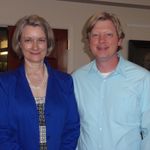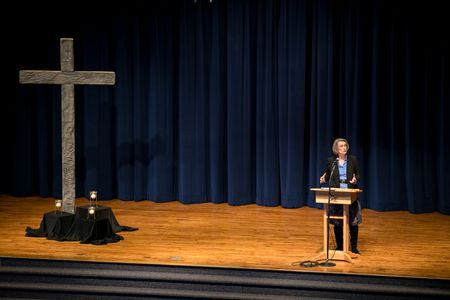News of the extended network of faculty, alumni, students, visiting researchers, and mission partners is regularly updated, and some of the big ideas or major events in Global Christianity are covered in the CGCM News.
Review of “Theology for the Global Church”
Student Travis Myers has reviewed a noteworthy book exploring theology and missiology, Local Theology for the Global Church: Principles for an Evangelical Approach to Contextualization. His review can be found in Missiology: An International Review 39, no. 3 (July 2011): 413-414.
Yale-Edinburgh Group meeting report by Daryl Ireland
 The Yale-Edinburgh Group held its 23rd meeting in New Haven, Connecticut, June 27-29, 2013. The theme, “Health, Healing, and Medicine in the History of Christian Missions and World Christianity,” inspired diverse papers, ranging from an investigation of John Wesley’s medical advice to the use of herbal medicine in Ghanaian Christianity.
The Yale-Edinburgh Group held its 23rd meeting in New Haven, Connecticut, June 27-29, 2013. The theme, “Health, Healing, and Medicine in the History of Christian Missions and World Christianity,” inspired diverse papers, ranging from an investigation of John Wesley’s medical advice to the use of herbal medicine in Ghanaian Christianity.
The number of participants was capped at 80, so having six people from Boston University demonstrated its prominence in the field of global Christianity. Dr. Sung-Deuk Oak (Th.D, 2002), Associate Professor at UCLA considered how Christian medical missions in Korea moved, “From the Plough of Evangelism to the Fruit of Christian Love,” during the 1920s. Also looking at Asia, Daryl Ireland investigated a mission hospital in China and asked if medicine was “Christian, Secular, or yet Something Else?” Daewon Moon pointed to the “Ruanda Mission and its Contribution to the East African Revival,” while Michele Sigg explained the prominent role women have played in “Carrying Living Water” during the fifohazana revival in Madagascar. In addition, Eva Pascal introduced a new movie on Seventh-Day Adventist medical work around the world. Gina Bellofatto, a student in the joint ThD program between Boston University and Gordon-Conwell Theological Seminary also attended the conference.
Dr. Fohle Lygunda visits the CGCM

The CGMC was delighted by the visit of Rev. Dr. Fohle Lygunda, Head of the Department of Missiology at International Leadership University (ILU) - Burundi, on June 14. Dr. Lygunda and Dr. Dana Robert discussed a possible collaboration for the Dictionary of African Christian Biography (DACB), which was transferred to Boston University in 2012. Dr. Lygunda previously worked as a Project Luke Fellow for the DACB at Overseas Ministries Study Center (OMSC) in New Haven, CT. He also wrote an article on Central Africa for the Atlas of Global Christianity: 1910-2010. Under his leadership, ILU-Burundi launched a master's program in Missiology, in which doctoral student Daewon Moon has served as a visiting lecturer since 2012.
Global Christian Shifts
Dr. Todd Johnson and doctoral student Gina Zurlo published a summary of the main findings of a 2013 update to the Atlas of Global Christianity for the Lausanne Global Analysis, entitled "Highlights of Christianity in its Global Context, 1970-2020: Society, Religion, and Mission." In it they emphasize that Christians today find themselves in very different contexts than 40 years ago and they note that fundamental shifts in the demographics of global Christianity are continuing. The full article can be accessed through The Center for the Study of Global Christianity website at Gordon-Conwell Theological Seminary.
New Photo from Eastern Mennonite U. Lectures
Thanks to EMU for permission to post it!
Lisa Beth White on BUniverse!
Rev. Lisa Beth White's lecture "How to Lead a Mission Trip" is now online at BUniverse!
A Message from Ted Karpf
CGCM Colleagues
For two years I have been working to bring a new course based on missions work in the HIV/AIDS to STH. This spring it has happened. The advert is below. More importantly, this is the first course with a critical international public health component and one which is field tested in missions round the world. Values and practices is based on my foundational work with the Ford Foundation and WHO on Decent Care. It will look at health and health systems and give a sense of how to understand what is happening in systems and what can change for the patient and family in that system. By enacting agency every one of us can be the manager of our own health care. For those of us in missions it is crucial to understand how each of us can have a say in what happens to people in health care encounters. The course will be driven the class itself with reasonable reading assignments and paper by midterm. The final will be the writing of an Op Ed piece, max 750 words. That should lighten the end of year issues, all to be done before finals week. Cannot figure out how to do this any better. It is a first-run course and we will learn from each other how best to make this work. So I hope you will consider signing up.
Best Always
Ted+
 Course Description
Course Description
Important theoretical and practical issues related to cross-cultural, governmental and nongovernmental and faith-based service work related to the practice of *Decent Care and its application in developing healthy communities will be surveyed.
Structured according a developmental approach to health and health systems, students will be encouraged to think critically about and experience the application of values and assumptions undergirding health systems and structures of such service work as currently envisioned and practiced.
Case studies, guest speakers, and multimedia offerings will enrich the context of informed disciplinary and cross disciplinary approaches.
*Decent Care is a concept developed in the World Health Organization by the instructor. Decent Care bases the planning, delivery and evaluation of care on values that place individuals, in their social and cultural contexts, at the center of the caring process. The aims of decent care are to develop health systems around the primacy of persons in their own health care, and to build a bridge between the principles of human rights and the practice of medicine. By listening to and honoring the voices of the people care processes and models can be developed that respond to the needs of a community enabling human flourishing.
Music and Mission
 Tracy Howe Wispelwey, a long-time singer and songwriter, visited the BUSTH on May 2, shared her journey, her vision for art and music being a restorative force in the world, and some of her songs. Psalm 126 has been particularly important to her. "It is how transformation happens," she said. "You do this and I will be there (not it will happen)." She likes to collaborate. In recent years she has worked closely with groups of people in many local contexts, particularly in Latin America. You can listen, download, or share some of Tracey's music here.
Tracy Howe Wispelwey, a long-time singer and songwriter, visited the BUSTH on May 2, shared her journey, her vision for art and music being a restorative force in the world, and some of her songs. Psalm 126 has been particularly important to her. "It is how transformation happens," she said. "You do this and I will be there (not it will happen)." She likes to collaborate. In recent years she has worked closely with groups of people in many local contexts, particularly in Latin America. You can listen, download, or share some of Tracey's music here.
Rev. Don Woolley on the Missional Church

Rev. Don Woolley, an Alabama pastor and leading activist in the movement to make the church a movement again, visited BUSTH on April 24 and 25 to talk with faculty, administrators, students, and Conference leaders of the local UMC about forming missional churches. A response to the end of Christendom, the purpose is to reorient the church from a bunker, deficit mentality to an external focus taking the Gospel out into the world."There is a difference between reaching out to the community because you need them to survive and reaching out because the community needs Jesus," said Woolley in his Thursday lecture.
Rev. Woolley is working closely with the Australian Alan Hirsch, founder of Forge International and Forge America, its spin-off in the U.S. Forge does domestic missionary training that is fully grounded in Scripture, something they believe churches forgot because of their status during the seventeen hundred years of Christendom. Their inspiration, rather, is the pre-Constantinian Early Christian Church where Christians took Jesus very seriously in spite of the radical implications of the gospel. They denied themselves. They loved others. Women had authority. And they grew hugely, even though they were illegal and the price of becoming a Christian might be death.
A lively discussion ensued about the differences between the church growth model, which Rev. Woolley feels is basically consumer driven and seems to be running out of steam, and the missional model he, Hirsch, and Forge are advancing.
Spring 2013 Newsletter is Here!
The CGCM Spring newsletter is done and available here. Check it out!
